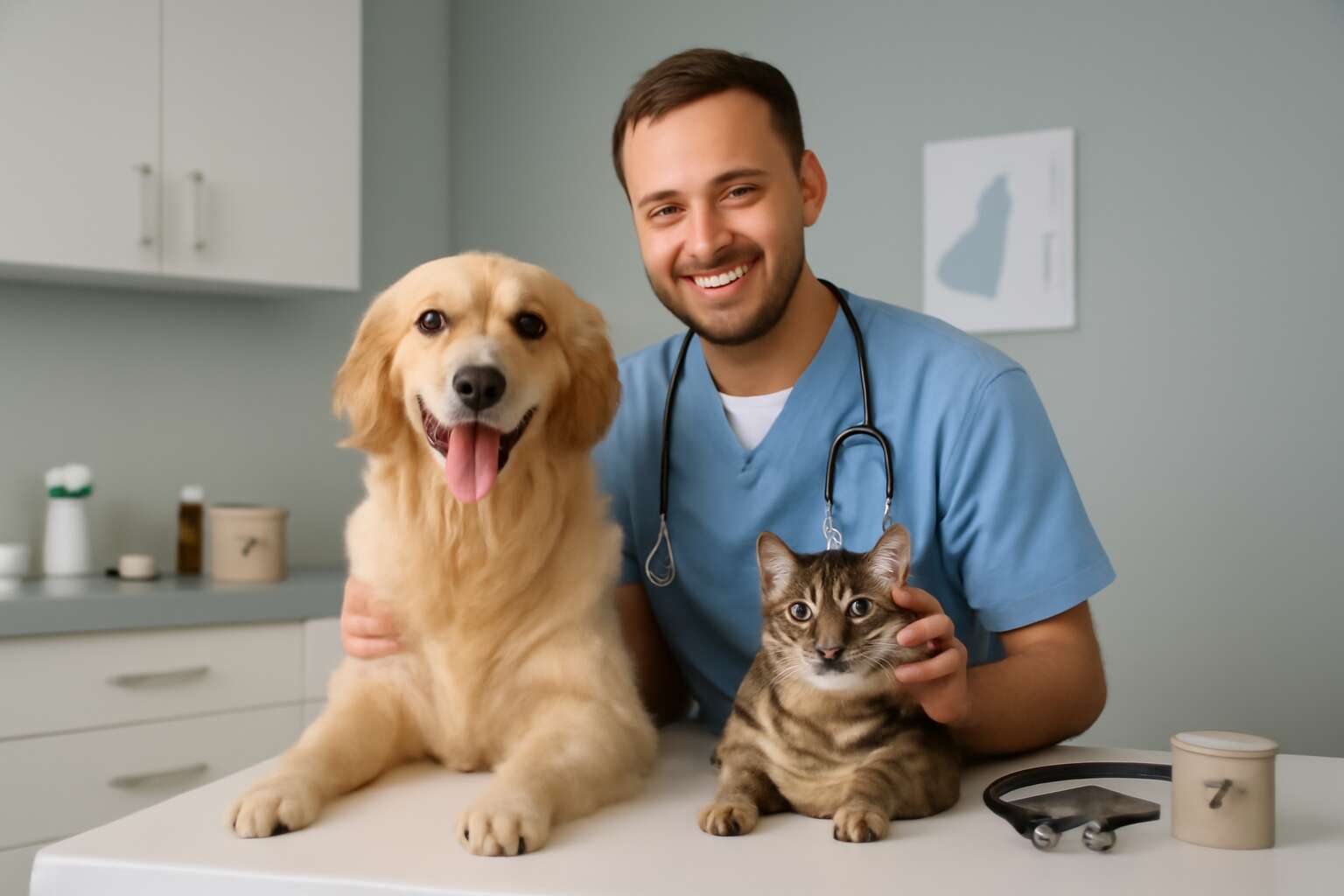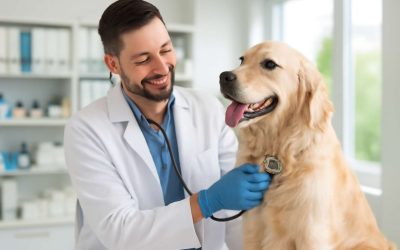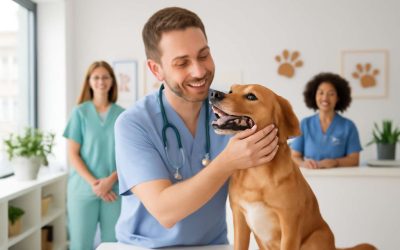Understanding the Taxability of Veterinary Services
Overview of Veterinary Services – Definition and scope of veterinary services provided to pet owners and livestock.
In the lush landscapes of South Africa, where the bond between humans and animals runs deep, veterinary services form the vital heartbeat of animal care. These services encompass a broad spectrum, from routine check-ups for beloved pets to complex surgeries for livestock. Veterinary practitioners serve as guardians, ensuring animals remain healthy and resilient amidst changing environments.
Yet, the question lingers in the air—are veterinary services taxable? To unravel this, one must understand the nature and scope of these services. Veterinary services include diagnostics, treatments, vaccinations, and preventive care, often tailored to meet the needs of both pet owners and farmers. The scope extends beyond pet wellness to the health of entire herds, making their role essential in agriculture and domestic life alike.
- Consultations and examinations
- Surgical procedures
- Laboratory testing and diagnostics
- Preventive vaccinations
Understanding whether these essential services are taxable hinges on the specific regulations that govern South African taxation policies, which often differentiate between healthcare services and commercial transactions. This distinction is crucial in determining the taxability of veterinary services.
General Tax Laws Affecting Veterinary Services – Overview of federal, state, and local tax regulations relevant to veterinary practices.
Understanding the tax landscape surrounding veterinary services is akin to navigating a labyrinth—complex, winding, and sometimes downright perplexing. In South Africa, tax laws are a patchwork of federal, provincial, and local regulations, each with its own quirks and nuances. While on the surface, healthcare services might seem exempt from VAT or sales tax, veterinary services often dance to their own tune.
Generally speaking, the question of are veterinary services taxable hinges on whether these services are classified as healthcare or as commercial transactions. The South African Revenue Service (SARS) tends to scrutinize veterinary services that extend beyond basic pet care, especially when they venture into the realm of lucrative surgeries, diagnostics, or livestock treatments. The distinction becomes murky when considering preventive vaccinations or laboratory diagnostics—are these essential healthcare services or taxable goods and services?
To clarify, many veterinary practices are subject to VAT if they provide taxable supplies, but there are exceptions. For instance, certain services aimed solely at animal health and welfare might be zero-rated or exempt. Therefore, understanding the specific regulations that impact veterinary practices is crucial to answering the question: are veterinary services taxable? Knowing the intricacies of South Africa’s tax laws can mean the difference between a compliant practice and a costly oversight.
Tax Treatment of Veterinary Services by Jurisdiction
State Regulations on Veterinary Services – Analysis of how different states treat veterinary services for sales tax purposes.
Across South Africa, the tax landscape for veterinary services remains a labyrinth of regulation, with each jurisdiction weaving its own intricate rules. In some provinces, veterinary services are considered essential, thus exempt from VAT, while others treat them as taxable supplies. This divergence often leaves veterinary practitioners navigating a complex maze of compliance, where a single misstep can lead to unexpected liabilities.
Regulations vary significantly by jurisdiction, and understanding the specific state rules is crucial. For example, certain regions may classify routine pet care as non-taxable, emphasizing the service’s necessity, whereas specialized treatments or elective procedures might be subject to VAT. To clarify this, here’s a quick overview:
- Assess whether the service is categorized as a basic necessity or a luxury.
- Determine if the service is provided to commercial livestock, which might have different tax implications.
- Verify if any exemptions apply based on local regulations or specific veterinary service types.
Such distinctions reveal the importance of staying updated on state-specific regulations—since the question “are veterinary services taxable” can vary dramatically depending on the jurisdiction within South Africa. This layered complexity keeps practitioners on their toes, ensuring they remain compliant in an ever-evolving legal environment.
Local Tax Policies – Impact of municipal or local taxes on veterinary service providers.
The tax landscape for veterinary services in South Africa is a shifting mosaic, heavily influenced by local policies that often catch practitioners off guard. Municipal or local taxes can significantly impact the cost structure of veterinary practices, sometimes turning a straightforward service into a complex tax puzzle. These regional levies, varying from one municipality to another, can add an unexpected layer of financial obligation.
In some jurisdictions, veterinary services are considered essential, leading to exemptions from VAT, while others treat them as taxable supplies. The impact of local taxes can differ sharply depending on where the service is provided. For example, certain areas impose additional municipal surcharges on veterinary clinics, which can influence pricing strategies and compliance efforts. It’s crucial for veterinary service providers to stay attuned to these regional nuances, as the question “are veterinary services taxable” is often a moving target based on local policies.
- Identify whether the municipal authority classifies veterinary services as essential or luxury.
- Determine if local taxes apply specifically to veterinary clinics or certain types of treatments.
- Verify if exemptions exist for services provided to non-profit or community-based organizations.
Understanding how local taxes influence the overall tax treatment of veterinary services ensures compliance and helps avoid costly missteps. The interplay of municipal policies and national regulations creates a labyrinth where every detail counts, making it vital for veterinary practices to stay informed and adaptable. After all, in the realm of South African veterinary services, the answer to “are veterinary services taxable” hinges on a web of jurisdictional intricacies that demand constant vigilance.
When Veterinary Services Are Taxable
Taxable vs. Nontaxable Veterinary Services – Identifying which types of veterinary services are subject to sales tax.
In the bustling world of pet care, one question echoes louder than a Labrador’s bark: are veterinary services taxable? The answer isn’t a simple yes or no; it depends on the type of service and the jurisdiction. While routine check-ups and vaccinations often slip under the radar, certain procedures and specialty services can turn the taxman’s gaze. The waters get murkier when considering whether diagnostic tests, surgical interventions, or cosmetic procedures are taxable or exempt. It’s crucial for veterinary practices to discern the fine line between taxable and nontaxable veterinary services, lest they find themselves inadvertently funding the government’s coffers with services that should be tax-free. Understanding which services fall into each category can save a practice from costly missteps, and ensure they stay compliant with local tax laws, especially in regions like South Africa where the tax landscape remains as dynamic as a playful kitten. So, when it comes to whether veterinary services are taxable, knowing the specifics makes all the difference.
Examples of Taxable Veterinary Services – Specific procedures or products that are often taxed, such as drug sales or certain surgeries.
In the realm of veterinary care, certain procedures and products frequently find themselves under the scrutinizing gaze of tax authorities. When pondering whether veterinary services are taxable, it’s essential to recognize that specific services and items—such as drug sales and surgical interventions—often carry a tax burden. For instance, medications sold directly to pet owners or livestock farmers are typically considered taxable, transforming routine drug dispensation into a revenue-generating event for the government.
Similarly, surgical procedures that go beyond basic treatment—like specialized operations or cosmetic enhancements—may also be classified as taxable services. This distinction hinges on local tax laws but is especially pertinent in regions like South Africa, where the tax landscape can be as unpredictable as a wild stallion. Understanding which veterinary services are taxable can prevent unintended financial pitfalls and ensure compliance with regional regulations. To clarify, here are some common examples of taxable veterinary services:
- Sale of pharmaceuticals and medications
- Elective or cosmetic surgeries
- Specialized diagnostic tests that involve advanced equipment
- Procedures performed for non-medical aesthetic purposes
Knowing when veterinary services are taxable helps practices navigate the complex web of local tax laws and avoid costly missteps. It’s a vital piece of the puzzle that ensures every pet’s health and well-being is complemented by sound financial practices, especially in a jurisdiction where the tax landscape remains as dynamic as a playful kitten chasing a ball of yarn.
Exemptions and Exceptions – Services that are typically exempt, such as emergency care or services for agricultural purposes.
In the shadowy corridors of tax law, the question persists—are veterinary services taxable? The answer, like the twisting roots of an ancient oak, is layered with exemptions and exceptions that can confound even the most seasoned practitioners. Certain services, rooted in urgency and necessity, often slip through the cracks of taxation. Emergency veterinary care, for instance, is typically considered exempt from sales tax, recognizing the critical importance of swift intervention over fiscal scrutiny.
Similarly, services rendered for agricultural purposes—such as those aiding farmers in livestock health—are frequently exempt, aligning with government policies that prioritize food security over revenue collection. This distinction is vital for veterinary practices navigating the murky waters of regional tax regulations in South Africa.
In regions where the tax landscape is as unpredictable as a midnight fog, understanding these exemptions can be the difference between compliance and costly oversight. The key is to discern which services serve the vital heartbeats of life and which are merely cosmetic or elective, for the law often treats them differently.
In the labyrinthine realm of tax legislation, the question lingers—are veterinary services taxable? The answer is not as straightforward as one might hope; it dances in the shadows of exemptions and special provisions. Emergency veterinary services, rooted in urgent necessity, are often classified as tax-exempt, acknowledging that life-saving care must not be hindered by fiscal chains.
Moreover, services rendered for agricultural purposes—such as livestock health management—tend to escape the grasp of sales tax, reflecting a governmental priority to bolster food security rather than revenue. This exemption becomes a vital beacon for veterinary practices working with farmers and rural communities across South Africa.
Understanding these nuances is crucial. In a landscape where tax laws shift like restless specters, knowing when veterinary services are exempt can shield practices from unforeseen liabilities. It’s a delicate balance—recognizing that some services are essential, and others, more elective, are subject to the dark, watchful eye of taxation.
Factors Influencing Taxability of Veterinary Services
Nature of Service Provided – Different tax treatments for consultations, treatments, surgeries, and diagnostic services.
The intricacies of taxation reveal themselves most vividly in the realm of veterinary services, where the nature of the service profoundly influences its taxability. Not all pet care or livestock treatment is created equal under the law—some procedures are deemed taxable, while others enjoy exemption. This distinction hinges on the specific type of veterinary service provided, which can seem subtle but has substantial implications for practice owners and clients alike.
Consultations, diagnostics, surgeries, and treatments each fall into different categories concerning their tax treatment. For instance, routine consultations often escape sales tax, seen as essential health advice rather than a taxable transaction. Conversely, certain surgical procedures or diagnostic testing may be classified as taxable services, especially if they involve the sale of tangible goods like medications or specialized equipment. To clarify, here is an example of how this varies:
- Services primarily intended for diagnostic purposes may be taxed if they include the sale of materials or pharmaceuticals.
- Procedures that are considered part of emergency or essential care often qualify for exemption, reflecting societal priorities for urgent health needs.
- Elective treatments or cosmetic procedures tend to be taxable, emphasizing their non-essential status from a legal perspective.
The line between taxable and non-taxable veterinary services is often blurred, making it crucial for practitioners to understand how the nature of each service impacts its tax status. Recognizing these distinctions can help prevent costly missteps and align a veterinary practice with current tax regulations—an ongoing dance with the complexities of South African tax law that demands careful attention and nuanced understanding.
Use of Products or Medications – Tax implications when medications or supplies are sold alongside services.
When it comes to the question of whether veterinary services are taxable, the use of products or medications can turn a straightforward consultation into a veritable tax tango. Selling pharmaceuticals or supplies alongside veterinary services introduces a layer of complexity that can trip up even the most seasoned practice owners. In South Africa, the tax implications hinge on whether these products are sold separately or as part of a bundled service.
If medications or supplies are sold outright—think of a bag of flea treatment or a bottle of antibiotics—those items are often considered tangible goods and typically attract sales tax. Conversely, if the medication is administered as part of a comprehensive service, such as surgery or emergency care, the entire package might be exempt from tax. The key is whether the sale of the product is incidental or a primary component of the service.
To clarify, here are some scenarios that influence whether veterinary services are taxable:
- Sale of pharmaceuticals or specialized equipment usually triggers tax liability.
- Services that include the sale of tangible goods are more likely to be taxed.
- Emergency or urgent care services, often bundled with necessary medications, might be exempt from sales tax.
Understanding these nuances can mean the difference between a compliant practice and one caught in a tax snafu. Recognizing how the use of products or medications impacts the taxability of veterinary services is crucial—after all, no one wants to be caught off guard by a surprise tax bill when providing vital animal care.
Customer Type – Tax rules regarding services provided to pet owners, farmers, or organizations.
In the complex dance of commerce, the question often arises: are veterinary services taxable? The answer hinges delicately on the nature of the customer and the context of the service. Pet owners, farmers, and organizations each navigate a unique set of tax rules, shaping the financial landscape of veterinary practice.
For pet owners, veterinary services are typically viewed as essential care rather than taxable transactions, especially when they involve routine consultations or treatments. However, when medications or supplies are sold separately—such as flea treatments or antibiotics—the sale of tangible goods often becomes taxable. Conversely, services provided to farmers or agricultural organizations sometimes enjoy exemptions, particularly when aimed at maintaining livestock health for commercial purposes. The key lies in understanding how different customer types influence the tax treatment.
In South Africa, the tax treatment may vary based on whether the service is classified as a sale of goods or a healthcare service. For example, providing emergency care bundled with medications might be considered a nontaxable service, yet selling a bag of pet food or veterinary supplies outright could trigger a tax liability. Recognizing these nuances ensures compliance and preserves the integrity of the practice. It’s a delicate balance—each customer type influences whether veterinary services are taxable, weaving a tapestry of regulation that demands keen awareness and careful navigation.
Implications for Veterinary Practices
Tax Collection and Remittance – Responsibilities of veterinary clinics in collecting and remitting sales tax.
In the intricate dance of commerce and care, veterinary practices bear a weighty responsibility—not just to heal, but to uphold the delicate balance of tax collection and remittance. When pondering whether are veterinary services taxable, it’s essential to recognize that the duty extends beyond the consultation room. Every service rendered, whether a routine check or a complex surgical procedure, might carry the invisible stamp of taxation depending on jurisdiction and context.
Veterinary clinics must navigate a labyrinth of tax laws, ensuring compliance while serving their clientele with integrity. This often involves meticulous record-keeping and timely remittance of sales tax, especially when medications or products are sold alongside services. The responsibility can be summarized thus:
- Identify which services or products are taxable.
- Calculate the correct sales tax based on local legislation.
- Remit collected taxes to the appropriate authorities within stipulated deadlines.
Failure to adhere to these obligations can lead to penalties or audits, compounding the already demanding nature of veterinary entrepreneurship. As stewards of health and well-being, veterinary service providers must also be vigilant custodians of tax compliance, ensuring that every transaction respects the legal frameworks that safeguard economic stability and fair trade.
Record Keeping Requirements – Documentation needed to comply with tax regulations.
For veterinary practices operating within South Africa, maintaining impeccable record-keeping is not merely a matter of administrative efficiency—it is a legal imperative. The intricacies of tax regulations require practices to meticulously document every transaction to ensure compliance with local tax laws. This becomes especially critical when considering the question, are veterinary services taxable. Accurate records serve as the backbone for demonstrating that taxes have been correctly calculated and remitted, shielding practices from potential audits or penalties.
Essential documentation includes detailed invoices, receipts, and sales records that clearly specify the services provided and any products sold. When medications or supplies are involved, it’s vital to distinguish between taxable and non-taxable items. To streamline this process, many practices adopt a standardized record-keeping system that captures:
- The nature of each service rendered
- Details of any products or medications sold
- The applicable sales tax rate based on jurisdiction
- Dates of service and transaction amounts
By maintaining comprehensive records, veterinary clinics not only comply with tax regulations but also enhance transparency and accountability. This diligent approach ensures that when the question, are veterinary services taxable, arises, the practice stands on a solid foundation of documented evidence. Ultimately, meticulous record keeping becomes a safeguard—protecting the practice’s integrity while respecting the complex tapestry of South African tax laws.
Impact on Pricing Strategy – How tax considerations influence pricing and billing practices.
Tax considerations are an often overlooked yet critical component of a veterinary practice’s pricing strategy. When the question of are veterinary services taxable arises, it directly influences how services are billed and how prices are structured. If certain services or products are taxable, practices must decide whether to incorporate the tax into the listed price or add it separately at checkout. This decision impacts customer perception, cash flow, and overall profitability.
In South Africa’s complex tax landscape, understanding which services are taxable allows veterinary clinics to set transparent prices while remaining compliant. When medications or diagnostic tests are taxed differently, practices need to adapt their billing systems accordingly. A clear grasp of these nuances ensures that the practice’s pricing stays competitive yet within legal boundaries.
Furthermore, a well-informed pricing strategy accounts for the potential variability in tax rates across different regions. Some practices may find it advantageous to adopt a uniform pricing model that factors in these tax implications, simplifying billing processes and reducing errors. Ultimately, navigating the question of are veterinary services taxable shapes how practices position themselves in a competitive market—balancing ethical transparency with financial sustainability!
Legal and Financial Considerations
Penalties and Audits – Potential legal consequences of non-compliance with tax laws.
In the labyrinth of tax regulations, one thing is crystal clear—ignoring the rules can turn your veterinary practice into a legal battleground! The potential penalties for non-compliance with tax laws are nothing to scoff at. From hefty fines to criminal charges, the risk of falling foul of tax authorities is a real threat that can devastate even the most well-meaning vet clinics. Penalties might include interest on unpaid taxes, suspension of licenses, or worse, a visit from the tax police wielding subpoenas like animal control officers wielding tranquilizers.
And let’s not forget the audits—those dreaded investigations that can feel like a veterinary exam gone rogue. During an audit, every invoice, receipt, and prescription could be scrutinized under a magnifying glass. If there’s a discrepancy—say, claiming that “are veterinary services taxable” as exempt when they aren’t—you could be staring down hefty fines or legal action. Staying compliant isn’t just about avoiding trouble; it’s about safeguarding your practice’s reputation and financial health.
Consulting with Tax Professionals – Importance of expert advice for veterinary practices.
In the complex arena of tax compliance, seeking expert advice is not just prudent—it’s essential. Veterinary practices operate within a labyrinth of regulations, where a single misstep can lead to severe financial repercussions. Consulting with seasoned tax professionals provides clarity amidst this chaos, ensuring your practice remains compliant and financially sound.
Understanding the intricacies of whether veterinary services are taxable requires more than a cursory glance at federal or local laws. Tax professionals can interpret these regulations, highlighting nuances that might otherwise be overlooked. They can help you navigate issues such as the classification of services—are veterinary services taxable?—and identify exemptions that could save your practice from unnecessary tax burdens.
Moreover, expert advice can bolster your record-keeping systems, ensuring proper documentation for all transactions. Proper records are the backbone of compliance, especially when tax authorities scrutinize your practice. With the right guidance, you’ll be better equipped to handle audits and avoid penalties—an aspect that could turn into a costly nightmare if overlooked. Remember, in the world of veterinary services and taxation, knowledge is power, and a trusted tax advisor is your most valuable ally.
Resources and Further Reading
Official Tax Authority Guidelines – Links to IRS, state revenue departments, and local tax agencies.
Understanding whether veterinary services are taxable can feel like navigating a labyrinth of regulations that shift with each jurisdiction. To unravel this complexity, consulting official resources is essential. These authoritative guidelines shed light on the nuanced ways tax laws apply to veterinary practices across different regions of South Africa.
For a comprehensive grasp, the best course of action is to reference the official tax authority guidelines. The South African Revenue Service (SARS) offers detailed documentation that clarifies the tax treatment of veterinary services, including the circumstances under which they are taxable. Additionally, many provincial revenue departments provide specific directives tailored to local regulations, which can vary significantly.
- Visit the SARS official website for the most current updates on veterinary service taxation.
- Check with your local municipal tax agencies for any regional policies impacting veterinary practices.
- Review detailed publications from the Department of Agriculture for exemptions related to agricultural veterinary services.
By consulting these trusted sources, veterinary professionals can ensure compliance and stay informed about the latest legislative shifts surrounding whether veterinary services are taxable. Staying proactive with official guidelines not only safeguards your practice from penalties but also sharpens your understanding of the evolving tax landscape. Remember, in the world of veterinary services, knowledge truly is power—and the key to navigating the tax maze with confidence.
Professional Associations and Advisory Services – Veterinary industry groups and tax advisory resources.
For veterinary practitioners navigating the intricate web of South African tax legislation, accessing authoritative resources is paramount. The landscape of tax laws, especially concerning whether veterinary services are taxable, is in constant flux, shaped by provincial nuances and evolving statutes. Engaging with industry-specific guidance can be the difference between compliance and inadvertent lapses.
Professional associations dedicated to the veterinary field often serve as invaluable repositories of knowledge, providing updates and interpretations that are tailored to the unique needs of veterinary clinics. These bodies not only advocate for the profession but also offer advisory services that clarify complex tax issues. For example, many associations compile comprehensive guides on the tax implications of services offered, helping members understand whether certain procedures or sales are taxable or exempt.
Furthermore, consulting specialized tax advisory services ensures a nuanced understanding of how regional policies impact your practice. They can assist in deciphering whether veterinary services are taxable in your specific locality and advise on optimal record-keeping practices. The synergy between industry groups and tax professionals creates a robust support network, empowering veterinary practices to stay ahead of legislative shifts while maintaining impeccable compliance standards.




0 Comments